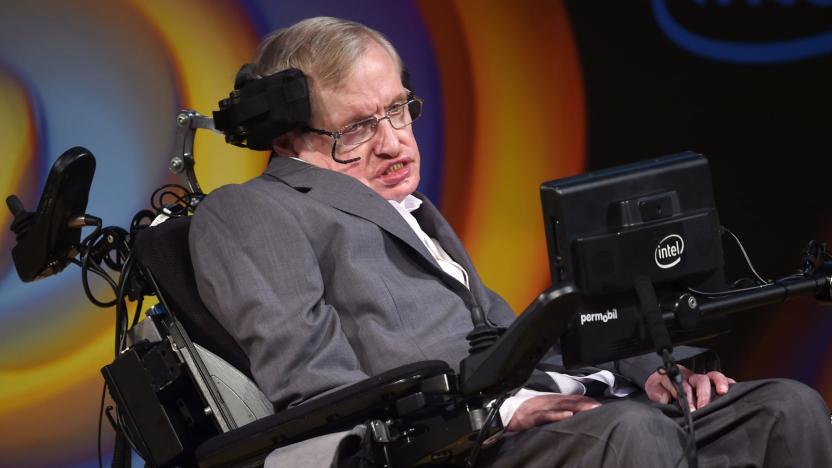TL18TSMRT
Latest

Stephen Hawking’s last paper has been published on multiverse theory
The last paper Stephen Hawking wrote before he died has now been published in the Journal of High Energy Physics. Though some version of the paper has been available on the preprint site arXiv since last year, it was submitted to the journal for review just days before Hawking passed, and it deals with some theoretical physics about the many universes that might have been created by the Big Bang.

Stephen Hawking makes his doctoral thesis available online
Ever wondered how Stephen Hawking saw the universe as a doctoral candidate, when his theories about black holes were just coming into fruition? You don't have to hear about it second-hand -- you can now go straight to the source. The legendary cosmologist has published his 1966 doctoral thesis online for anyone to read, making it available to the public for the first time. Hawking is posting his work in hopes that it'll spark interests in both space itself and sharing research. "I hope to inspire people around the world to look up at the stars and not down at their feet," he said.

NASA is helping Stephen Hawking get a tiny ship to Alpha Centauri
NASA is helping Stephen Hawking and Russian venture capitalist Yuri Milner with the monumental task of getting a tiny probe to Alpha Centauri, the nearest star system to Earth. Project Starshot aims to propel a lightweight silicon "StarChip" to one-fifth the speed of light by hitting it with lasers from Earth, getting it to the star within 20 years. The space agency will help solve one of the thorniest problems -- the intense radiation of interstellar travel.

Stephen Hawking warns humans may have only 1,000 years left on Earth
Renowned theoretical physicist Stephen Hawking spoke at the Oxford Union earlier this week, and the headline takeaway from the speech has been a statement that humanity needs to find a new place to live, and fast. The Daily Mail reports the professor told attendees "I don't think we will survive another 1,000 years without escaping our fragile planet," but really, there's at least one reason for optimism. As one of the greatest minds alive, Hawking has been making this prediction for years, and hysteria over recent events doesn't appear to have affected his timeline (yet). He made the same claim, word for word, during a speech at Cedars-Sinai Hospital in 2013.

Stephen Hawking: 'The real risk with AI isn't malice but competence'
Artificial intelligence was one of the biggest topics during Stephen Hawking's Reddit AMA (Ask Me Anything) earlier this year. So it's not too surprising that Hawking used up a significant portion of his answers to that Q&A session, released by Reddit yesterday, by clarifying his stance on dangerous artificial intelligence. "The real risk with AI isn't malice but competence," he wrote to a teacher who's tired of having the "The Terminator Conversation" with his students -- that is, explaining away the notion that evil, killer robots will be the main danger with AI. "A superintelligent AI will be extremely good at accomplishing its goals, and if those goals aren't aligned with ours, we're in trouble." Hawking previously warned that AI could "spell the end of the human race," and he also joined Elon Musk and other notable technologists to call for a ban on autonomous weapons.

Stephen Hawking believes he knows how information escapes black holes
Stephen Hawking announced during a lecture at the KTH Royal Institute of Technology in Stockholm, Sweden on Tuesday that he has potentially solved the Information Paradox. The paradox a conflict between the quantum mechanics and general relativity models that has vexed physicists for more than four decades. The Information Paradox arises from black holes -- specifically what happens to information about the physical state of objects that fall into one. The quantum mechanical model posits that the information remains intact while general relativity argues that it is indeed obliterated under the black holes immense gravitation. But Hawking has developed a third opinion: the information never actually makes it into the black hole. "I propose that the information is stored not in the interior of the black hole as one might expect, but on its boundary, the event horizon," he said.

Stephen Hawking is still terrified of the AI revolution
When renowned physicist Stephen Hawking repeatedly warns us about the impending robot apocalypse, we should probably pay attention. "The development of full artificial intelligence could spell the end of the human race," Hawking told the BBC yesterday. While he admits early forms of AI have been useful (it's clearly been a huge help for his speech systems), he worries that we won't be able to keep up with super-intelligent versions that outwit humans. Hawking made similar comments back in May when he called the development of full AI "potentially our greatest mistake in history." (Or maybe he just really hated Transcendence.) And he's not the only genius singing this tune; Tesla's Elon Musk is also afraid of a Terminator scenario. While plenty of scientists have far more measured expectations for AI, Hawking's comments are worth noting. We really don't know what's ahead for intelligent machines, so perhaps we should proceed with caution.





